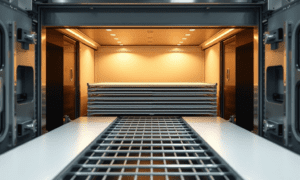The integration of technology has resulted in a dramatic alteration of the production landscape. Advancements in the digital age have revolutionized how products are made, impacting processes, efficiency, and the overall future of manufacturing. This evolution has ushered in a new era of smarter, more agile, and technologically advanced manufacturing practices, fostering increased productivity and innovation across the industry.
Internet of Things (IoT) in Manufacturing
The way that machinery and equipment interact and communicate in the manufacturing setting has been completely transformed by the incorporation of the Internet of Things (IoT). IoT sensors embedded in machinery collect vast amounts of data, fostering a connected ecosystem where information is continuously shared among devices. This seamless communication enables predictive maintenance, where these devices monitor themselves and anticipate potential issues or breakdowns, allowing for preemptive repairs. Real-time monitoring through IoT devices allows manufacturers to analyze production metrics on the fly, optimizing efficiency and swiftly addressing any anomalies or deviations in the manufacturing process. This interconnectedness has significantly enhanced production processes by minimizing unplanned downtimes and increasing overall operational efficiency within manufacturing facilities.
The Role of Automation and Robotics
Automation and robotics play a pivotal role in optimizing production processes, often leading to increased efficiency in manufacturing. These technological advancements have streamlined workflows by carrying out repetitive tasks with precision, minimizing the margin for error. Automated systems can operate continuously, resulting in faster production rates while ensuring consistency in output quality. Additionally, robotics equipped with advanced sensors and programming can perform intricate tasks that might be arduous or unsafe for human workers, contributing to a safer working environment. This synergy of automation and robotics has transformed traditional manufacturing methods, introducing a new era of productivity and precision in the industry. The integration of automation and robotics not only elevates manufacturing efficiency but also allows businesses to allocate human resources to tasks that require problem-solving and creativity, further enhancing the value of the manufacturing process.
Additive Manufacturing and 3D Printing
The production landscape has changed dramatically thanks to additive manufacturing and 3D printing. Thanks to the technology’s unmatched versatility, producers can now design and create complex components that were before challenging or impossible to create with traditional techniques. This innovation has significantly reduced the time and cost required for prototyping and producing complex components, fostering greater innovation and creativity in design. Additive manufacturing enables the creation of products layer by layer, reducing material waste and allowing for customization, which is particularly beneficial for creating specialized or unique items. As technology continues to advance, it’s poised to transform how various industries approach design and production, making manufacturing processes more agile and adaptable to changing demands.
Big Data and Analytics
Big data and analytics combined with manufacturing have simplified operations by giving manufacturers a better understanding of their production processes. Manufacturers can collect and analyze data from various sources within the production line, enabling predictive maintenance that anticipates and prevents equipment failures. Additionally, the utilization of data analytics aids in forecasting market demands, which allows manufacturers to adjust their production schedules and inventories more accurately. This assures, in addition to cutting waste, that the appropriate goods are accessible to suit customer expectations. Moreover, the implementation of analytics helps in resource allocation, optimizing energy usage, and material flow throughout the production chain. These data-driven insights empower manufacturers to make informed, efficient, and agile decisions, improving overall productivity and reducing operational costs.
Cybersecurity Concerns and Data Protection
In the rapidly evolving manufacturing landscape, cybersecurity threats are a growing concern. With the integration of advanced technology, the risk of cyberattacks, data breaches, and intellectual property theft has increased. Manufacturers face the challenge of safeguarding critical information and systems from sophisticated cyber threats that can disrupt operations, compromise sensitive data, or cause financial loss. Protecting networks, intellectual property, and confidential data becomes paramount in the face of these evolving cyber threats. It requires robust cybersecurity measures, constant monitoring, and proactive responses to prevent potential cyberattacks and maintain the integrity and security of an online manufacturing network.
Conclusion
The industrial sector is currently undergoing a digital revolution that is changing the face of traditional production. By utilizing different technical innovations, the industry keeps coming up with new ideas, streamlines operations, and pushes the limits of what production can do. Manufacturing is poised to enter a new age with the ongoing integration of cutting-edge technology, bringing with it unmatched efficiency, personalization, and sustainable practices in the sector.



































